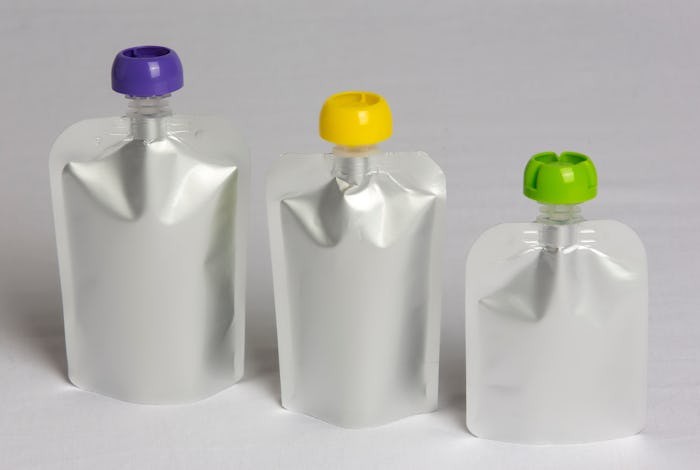The day my daughter was old enough to try solids, I ran to the grocery store to buy plenty of fresh fruits and veggies so I could make homemade baby food. When I was done pretending to be Laura Ingalls Wilder, I started looking at pre-packaged baby food. From tiny jars to plastic trays, the options for baby food seemed endless and convenient — especially those baby food pouches. They're the perfect size to grab, not to mention they're a lot less work than spooning food into your baby's mouth, but are baby food pouches safe for your kids? Something felt off about what was, essentially, a plastic bag of food purée convenient enough for my kid to suck on.
Turns out, many experts feel the same way about baby food pouches. Never mind the fact that you can't actually see what's inside of them (something that legit freaks me out), the art of letting your baby eat from a baby food pouch isn't exactly a milestone pediatricians and dietitians want your baby to hit. Pediatric dietitian Pegah Jalali, RD, MS, CDN, tells Romper in an email that she strongly discourages her clients and patients from using baby food pouches. "I believe it affects their ability to develop oral motor development and self-feeding," Jalali says. "Pouch feeding is very similar to bottle-feeding, and as babies develop, they need to be challenged with foods (different textures especially) so that they can develop the ability to chew, bite, and even sense textures in their mouths."
She also notes that pouches can be great "sometimes on the go" or as a travel food, but they shouldn't be used every day. "Babies should be spoon fed purées and they should be offered different textures, including less thin purées." Jalali suggests that while pouches are no more filled with sugar than a typical baby food, these baby food pouches can cause issues with a baby's eating habits. "Since they have become more and more popular, I see so many toddlers for 'texture issues' or 'oral motor sensory issues' which I believe is caused largely because babies are not challenged with appropriate textures from a young age."
Your baby's eating habits aren't the only concern, either. While Dr. Veerabhadrudu Kuncham agrees with Jalali that babies should be exposed to all flavors and textures of food, he suggests the safety of baby pouches also depends on how they're used. "If proper hygiene is not maintained, they are good sources for transmitting infections," Kuncham tells Romper in an email. "A fresh pouch when consumed within the expiry date is OK, but it's better to pour the contents into a bowl and let babies have spoons."
Dr. Sonali Ruder, food blogger, Emergency Medicine physician, and author of the cookbook, Natural Baby Food, tells Romper in an email that the good news about baby food pouches is that "there are many healthy, additive-free options available on the market, including many organic brands." She notes that they also contain lots of fruits and vegetables, which are often lacking in children’s diets.
Ruder makes another worthwhile claim about baby food pouches — they could lead to poor eating habits that aren't related to oral-motor health. "Because pouches are so portable and easy to slurp down, babies can tend to overeat them, making them less hungry at mealtime," she says. "Another downside of pouches is that although they often contain vegetables, they all tend to taste sweet because they are usually blended with a fruit purée or sweet vegetable. Children already have a predilection for sweet — our goal should be to get them to appreciate the real flavors of a wide variety of wholesome foods, including savory vegetables, meats, and grains."
I know — you're officially overwhelmed. Look, it's OK to use baby food pouches when you're in a rush or when you're traveling and don't have time to stop for a full meal. The trick is to not make baby food pouches the only feeding method your baby is exposed to. So if you do decide to try a few out, Product Safety Investigator Kayla Mackie from ConsumerSafety.org tells Romper to make sure the baby food pouches you're choosing are safe. "The safety of these pouches vary depending on which brand you choose," Mackie says. "When looking for the safest option, be sure they are BPA-free, GMO-free, and check the ingredients to be sure they don't contain any preservatives or sweeteners. Just because they say it's organic, doesn't mean it's the safest option."
If you're worried about your child having plastic in their mouth, it's understandable. But Mackie says as long as you find BPA-free packaging, you should be OK. "If the packaging is BPA-free, it's safe enough to consume what's inside without contracting the nasty toxins from plastic." Just remember, the pouches aren't recyclable.
Convenience is incredibly important to parents, but when it comes to baby food, use these pouches in moderation. Squirt them into a bowl for your baby to use a spoon or stick with the classic glass jarred baby food if you're not comfortable. No matter how you decide to feed your baby, those strained peas will still get all over the place.
